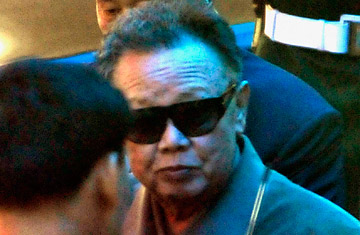
North Korean leader Kim Jong Il in Dalian, China, on May 3, 2010
Kim Jong Il doesn't take road trips much these days. He's 68 years old and not fully recovered from a stroke he suffered nearly two years ago. His country is as impoverished as ever, with some analysts warning of a return to the famine conditions that killed tens of thousands of the dictator's subjects in the late 1990s. The world wants him to return to negotiations over North Korea's nuclear weapons program, but he has shown little interest. Indeed, though Pyongyang denies it, Kim's government is suspected of having blown up a South Korean naval ship just a month ago, killing 46 sailors — not exactly a signal that he desires a return to the warm embrace of the six-party talks. He is, after all, preoccupied at home, trying to arrange a succession to the leadership for his 28-year-old son, whom no one in the outside world knows anything about.
But now he has taken to the road, packing up his 17-car luxury train and making his first trip to China since 2006. He arrived on Monday, May 3, in Dalian, a northeastern port city, and is believed to be headed to Beijing for talks with China's top leaders on Wednesday.
They have a lot to discuss, and Kim is not likely to find his hosts in a particularly good mood. China's basic interest since the end of the Korean War 57 years ago has been stability in the north, as North Korea is a useful buffer state in northeast Asia, a region that — in the security sphere, at least — is still dominated by the U.S. and its allies. More recently, Beijing has sought increased access to the minerals and commodities in North Korea that are useful in fueling China's continued economic growth. And over the past several years, China has — depending on whom you believe — either exerted useful pressure on North Korea to engage in the six-party talks or just pretended to do so.
Under normal circumstances, those topics would dominate any discussions between the allies, which are, as the saying goes, as close as lips and teeth. The problem for both is that these are not normal circumstances. The March 26 sinking of the South Korean navy corvette the Cheonan in South Korean waters has made this a delicate trip for the Dear Leader and his Chinese hosts. Seoul is convinced the ship was struck by a North Korean torpedo, though it hasn't said so definitively or publicly yet, while Pyongyang has denied any responsibility.
South Korea is said to be annoyed, at minimum, that Beijing is even hosting Kim so soon after the alleged attack, even though the visit was planned months ago. In a speech on Tuesday in Seoul, South Korean President Lee Myung Bak made it clear that the Cheonan incident trumps everything else when it comes to inter-Korean relations. South Korea has put together an international investigative team from the U.S., Australia, the U.K. and Sweden to seek conclusive proof of why the vessel sank. If and when that information is obtained, Lee said, Seoul will take "clear and stern measures" against those responsible. The sinking, he added, was not a simple accident. "Immediately after the incident, I had a hunch that it was a grave international issue involving the relations between the South and North," he said.
And that's why Beijing is unhappy. As Yoo Se-hee, a professor at Hanyang University in Seoul, points out, two of the things that cause instability in North Korea are "heightened tension between the two Koreas and external pressure on North Korea that threatens its system and security." No. 1 is now a given, and it's likely that a furious South Korea will push the U.S., an ally, to join it and seek punitive sanctions against the North if the multinational investigative team unearths the smoking torpedo.
That's going to put Beijing in an uncomfortable spot. Kim, no doubt, has the beggar's cup out this week, given how dire his country's economy is. Internal political stability requires that there be no economic collapse, so even as South Korea withdraws the small amount of monetary assistance and trade it had been allowing to flow North, China will probably step into the breach. But Kim, as Yoo points out, probably wants assurances that Beijing will carry the North's water at the U.N. should international heat intensify over the Cheonan sinking. China has more or less stuck by its so-called friend in Pyongyang — in bad times and in worse times. (There are no good times in North Korea.) Now Kim has come a-callin' again, surely asking for support one more time. "That is the dilemma China has to live with," Yoo says. They say you can't choose your enemies but you can choose your friends. Why the People's Republic of China still calls North Korea a friend and an ally is an increasingly uncomfortable question for Beijing as the years go by. And it's in the process of becoming even more so.
— With reporting by Stephen Kim / Seoul
